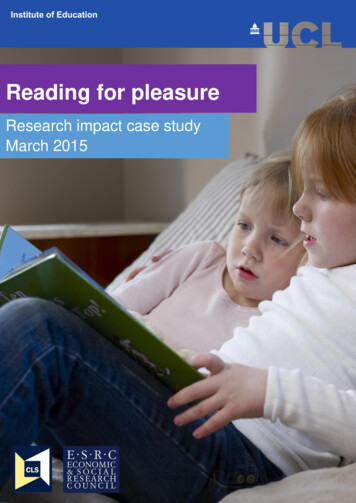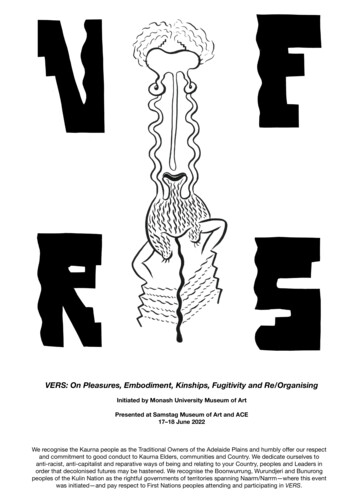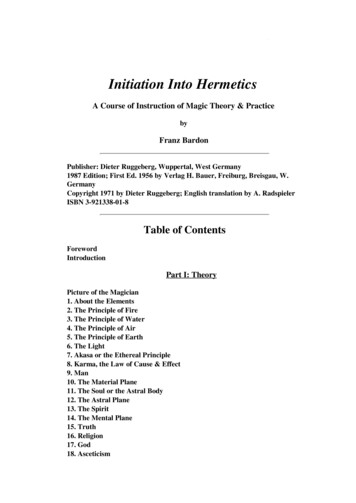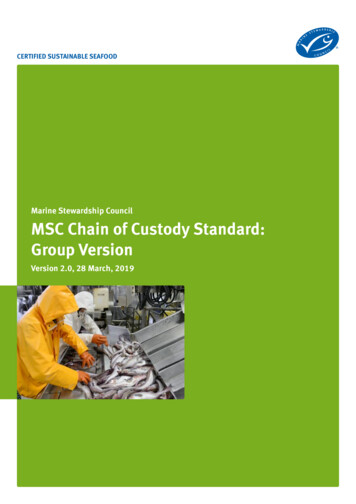
Transcription
THE INTERNATIONALPSYCHO-ANALYTICAL LIBRARYEDITED BY ERNEST JONESNo. 4
THE INTERNATIONAL PSYCHO-ANALYTICAL LIBRARYNo. 4BEYOND THE PLEASURE PRINCIPLEBYSIGM. FREUD, M.D., LL.D.AUTHORIZED TRANSLATIONFROM THE SECOND GERMAN EDITIONBY C.J.M. HUBBACKTHE INTERNATIONAL PSYCHO-ANALYTICAL PRESSLONDONMCMXXIIVIENNA
EDITORIAL PREFACEI have revised this translation, so carefully made by MissHubback, several times, but I feel that it calls for specialindulgence on the part of the reader. On account, doubtless,of the extreme complexity and re-markable novelty of theideas which Professor Freud here expounds, comprising asthey do his thoughts on the ultimate problems of life, thestyle is one of exceptional difficulty. As it is more importantto render his ideas precisely than to clothe them in anothergarb, we decided to adhere faithfully to the original even atthe expense of some uncouthness as regards the English.The word Unlust, as in the phrase pleasure-pain principle,has been translated as ‗pain‘; pain without inverted commassignifies Schmerz in the original. The word Besetzung(literally: state of being occupied), as in the expressionsBesetzungsenergie and Energiebesetzung has beenrendered by the words ‗investment‘ or ‗charge‘, the latterbeing taken from the analogy of electricity. These and othertechnical terms will be discussed in a Glossary which it isintended to publish as a supplement to the InternationalJournal of Psycho-Analysis.
BEYOND THE PLEASURE PRINCIPLEIIn the psycho-analytical theory of the mind we take it forgranted that the course of mental processes is automaticallyregulated by the ‗pleasure-principle‘: that is to say, we believethat any given process originates in an unpleasant state oftension and thereupon determines for itself such a path thatits ultimate issue coincides with a relaxation of this tension,i.e. with avoidance of ‗pain‘ or with production of pleasure.When we consider the psychic processes under observationin reference to such a sequence we are introducing into ourwork the economic point of view. In our opinion apresentation which seeks to estimate, not only thetopographical and dynamic, but also the economic elementis the most complete that we can at present imagine, anddeserves to be distinguished by the term meta-psychological.We are not interested in examining how far in our assertionof the pleasure-principle we have approached to or adoptedany given philosophical system historically established. Ourapproach to such speculative hypotheses is by way of ourendeavour to describe and account for the facts falling withinour daily sphere of observation. Priority and originality arenot among the aims which psycho-analysis sets itself, and theimpressions on which the statement of this principle isfounded are of so unmistakable a kind that it is scarcelypossible to overlook them. On the other hand, we shouldwillingly acknowledge our indebtedness to any philosophicalor psychological theory that could tell us the meaning ofthese feelings of pleasure and ‗pain‘ which affect us sopowerfully. Unfortunately no theory of any value isforthcoming. It is the obscurest and least penetrable regionof psychic life and, while it is impossible for us to avoidtouching on it, the most elastic hypothesis will be, to mymind, the best. We have decided to consider pleasure and‗pain‘ in relation to the quantity of excitation present in thepsychic life—and not confined in any way—along such linesthat ‗pain‘ corresponds with an increase and pleasure with adecrease in this quantity. We do not thereby commitourselves to a simple relationship between the strength ofthe feelings and the changes corresponding with them, leastof all, judging from psycho-physiological experiences, to anyview of a direct proportion existing between them; probablythe amount of diminution or increase in a given time is
the decisive factor for feeling. Possibly there is room herefor experimental work, but it is inadvisable for us analysts togo further into these problems until we can be guided byquite definite observations.We cannot however profess the like indifference when wefind that an investigator of such penetration as G.Th.Fechner has advocated a conception of pleasure and ‗pain‘which in essentials coincides with that forced upon us bypsycho-analytic work. Fechner‘s pronouncement is to befound in his short work ‗Einige Ideen zur Schöpfungs- undEntwicklungsgeschichte der Organismen‘, 1873 (Section XI,Note p. 94) and reads as follows: ‗In so far as consciousimpulses always bear a relation to pleasure or ―pain‖,pleasure or ―pain‖ may be thought of in psycho-physicalrelationship to conditions of stability and instability, andupon this may be based the hypothesis I intend to developelsewhere, viz.: that every psycho-physical movement risingabove the threshold of consciousness is charged withpleasure in proportion as it approximates—beyond a certainlimit—to complete equilibrium, and with ―pain‖ inproportion as it departs from it beyond a certain limit; whilebetween the two limits which may be described as thequalitative thresholds of ―pain‖ or pleasure, there is a certainarea of aesthetic indifference.‘The facts that have led us to believe in the supremacy of thepleasure-principle in psychic life also find expression in thehypothesis that there is an attempt on the part of the psychicapparatus to keep the quantity of excitation present as low aspossible, or at least constant. This is the same suppositiononly put into another form, for, if the psychic apparatusoperates in the direction of keeping down the quantity ofexcitation, all that tends to increase it must be felt to becontrary to function, that is to say painful. The pleasureprinciple is deduced from the principle of constancy; inreality the principle of constancy was inferred from the factsthat necessitated our assumption of the pleasure-principle.On more detailed discussion we shall find further that thistendency on the part of the psychic apparatus postulated byus may be classified as a special case of Fechner‘s principleof the tendency towards stability to which he has related thepleasure-pain feelings.In that event, however, it must be affirmed that it is notstrictly correct to speak of a supremacy of the pleasureprinciple over the course of psychic processes. If such
existed, then the vast majority of our psychic processeswould necessarily be accompanied by pleasure or wouldconduce to it, while the most ordinary experienceemphatically contradicts any such conclusion. One can onlysay that a strong tendency towards the pleasure-principleexists in the psyche, to which, however, certain other forcesor conditions are opposed, so that the ultimate issue cannotalways be in accordance with the pleasure-tendency.Compare the comment of Fechner in a similar connection.1‗'Therewithal it is to be noted that the tendency towards thegoal does not imply the attainment of it and that in generalthe goal is only approximately attainable . . . .‘ If we nowaddress ourselves to the question of what circumstances havethe power to frustrate the successful carrying out of thepleasure-principle we shall be treading on safer and betterknown ground, and we can draw in abundant measure onour analytical experiences for the answer.The first case of such a check on the pleasure-principle isperfectly familiar to us in the regularity of its occurrence. Weknow that the pleasure-principle is adjusted to a primarymode of operation on the part of the psychic apparatus, andthat for the preservation of the organism amid the difficultiesof the external world it is ab initio useless and indeed extremely dangerous. Under the influence of the instinct of theego for self-preservation it is replaced by the ‗realityprinciple‘, which without giving up the intention of ultimatelyattaining pleasure yet demands and enforces thepostponement of satisfaction, the renunciation of manifoldpossibilities of it, and the temporary endurance of ‗pain‘ onthe long and circuitous road to pleasure. The pleasureprinciple however remains for a long time the method ofoperation of the sex impulses, which are not so easilyeducable, and it happens over and over again that whetheracting through these impulses or operating in the ego itselfit prevails over the reality-principle to the detrimentof the whole organism.It is at the same time indubitable that the replacement of thepleasure-principle by the reality-principle can account onlyfor a small part, and that not the most intense, of painfulexperiences. Another, and no less regular source of ‗pain‘proceeds from the conflicts and dissociations in the psychicapparatus during the development of the ego towards a morehighly co-ordinated organisation. Nearly all the energy withwhich the apparatus is charged comes from the inborninstincts, but not all of these are allowed to develop to the
same stage. On the way it over and again happens thatparticular instincts, or portions of them, prove irreconcilablein their aims or demands with others which can be weldedinto the comprehensive unity of the ego. They arethereupon split off from this unity by the process ofrepression, retained on lower stages of psychic development,and for the time being cut off from all possibility ofgratification. If they then succeed, as so easily happens withthe repressed sex-impulses, in fighting their way through—along circuitous routes—to a direct or a substitutivegratification, this success, which might otherwise havebrought pleasure, is experienced by the ego as ‗pain‘. Inconsequence of the old conflict which ended in repressionthe pleasure-principle has been violated anew, just at themoment when certain impulses were at work on theachievement of fresh pleasure in pursuance of the principle.The details of the process by which repression changes apossibility of pleasure into a source of ‗pain‘ are not yet fullyunderstood, or are not yet capable of clear presentation, butit is certain that all neurotic ‗pain‘ is of this kind, is pleasurewhich cannot be experienced as such.The two sources of ‗pain‘ here indicated still do not nearlycover the majority of our painful experiences, but as to therest one may say with a fair show of reason that theirpresence does not impugn the supremacy of the pleasureprinciple. Most of the ‗pain‘ we experience is of a perceptualorder, perception either of the urge of unsatisfied instincts orof something in the external world which may be painful initself or may arouse painful anticipations in the psychicapparatus and is recognised by it as ‗danger‘. The reaction tothese claims of impulse and these threats of danger, areaction in which the real activity of the psychic apparatus ismanifested, may be guided correctly by the pleasureprinciple or by the reality-principle which modifies this. Itseems thus unnecessary to recognise a still more far-reachinglimitation of the pleasure-principle, and nevertheless it isprecisely the investigation of the psychic reaction to externaldanger that may supply new material and new questions inregard to the problem here treated.
IIAfter severe shock of a mechanical nature, railway collisionor other accident in which danger to life is involved, acondition may arise which has long been recognised and towhich the name ‗traumatic neurosis‘ is attached. The terriblewar that is just over has been responsible for an immensenumber of such maladies and at least has put an end to theinclination to explain them on the basis of organic injury tothe nervous system due to the operation of mechanicalforce.2 The clinical picture of traumatic neurosis approachesthat of hysteria in its wealth of similar motor symptoms, butusually surpasses it in its strongly marked signs of subjectivesuffering—in this resembling rather hypochondria ormelancholia—and in the evidences of a far morecomprehensive general weakening and shattering of themental functions. Neither the war neuroses nor thetraumatic neuroses of peace are as yet fully understood.With the war neuroses some light was contributed, but alsoon the other hand a certain confusion introduced, by the factthat the same type of malady could occasionally occurwithout the interposition of gross mechanical force. In thetraumatic neuroses there are two outstanding features whichmight serve as clues for further reflection: first that the chiefcausal factor seemed to lie in the element of surprise, in thefright; and secondly that an injury or wound sustained at thesame time generally tended to prevent the occurrence of theneurosis. Fright, fear, apprehension are incorrectly used assynonymous expressions: in their relation to danger theyadmit of quite clear distinction. Apprehension (Angst)denotes a certain condition as of expectation of danger andpreparation for it, even though it be an unknown one; fear(Furcht) requires a definite object of which one is afraid;fright (Schreck) is the name of the condition to which one isreduced if one encounters a danger without being preparedfor it; it lays stress on the element of surprise. In my opinionapprehension cannot produce a traumatic neurosis; inapprehension there is something which protects againstfright and therefore against the fright-neurosis. We shallreturn later to this dictum.The study of dreams may be regarded as the mosttrustworthy approach to the exploration of the deeperpsychic processes. Now in the traumatic neuroses the dreamlife has this peculiarity: it continually takes the patient backto the situation of his disaster, from which he awakens inrenewed terror. This fact has caused less surprise than it
merits. The obtrusion on the patient over and again, even insleep, of the impression made by the traumatic experience istaken as being merely a proof of its strength. The patient hasso to speak undergone a psychical fixation as to the trauma.Fixations of this kind on the experience which has broughtabout the malady have long been known to us in connectionwith hysteria. Breuer and Freud stated in 1893 that hystericssuffer for the most part from reminiscences. In the warneuroses, observers, such as Ferenczi and Simmel, havebeen able to explain a number of motor symptoms asfixation on the factor of the trauma.But I am not aware that the patients suffering from traumaticneuroses are much occupied in waking life with therecollection of what happened to them. They perhaps striverather not to think of it. To regard it as self-evident that thedream at night takes them back to the situation which hascaused the trouble is to misunderstand the nature of dreams.It would be more in correspondence with that nature if thepatient were presented (in sleep) with images from the timeof his normal health or of his hoped-for recovery. If we arenot to go thoroughly astray as to the wish-fulfilment tendencyof the dream in consequence of these dreams of the shockneuroses, perhaps the expedient is left us of supposing thatin this condition the dream function suffers dislocation alongwith the others and is diverted from its usual ends, or else weshould have to think of the enigmatic masochistic tendenciesof the ego.I propose now to leave the obscure and gloomy theme of thetraumatic neuroses and to study the way in which the psychicapparatus works in one of its earliest normal activities. I referto the play of children.The different theories of child-play have recently beencollated by S. Pfeifer in Imago 3 and their analytical valueestimated; I may here refer the reader to this work. Thesetheories endeavour to conjecture the motives of children‘splay, though without placing any special stress on the‗economic‘ point of view, i.e. consideration of the attainmentof pleasure. Without the intention of making a comprehensive study of these phenomena I availed myself of anopportunity which offered of elucidating the first gameinvented by himself of a boy eighteen months old. It wasmore than a casual observation, for I lived for some weeksunder the same roof as the child and his parents, and it was a
considerable time before the meaning of his puzzling andcontinually repeated performance became clear to me.The child was in no respect forward in his intellectualdevelopment; at eighteen months he spoke only a fewintelligible words, making besides sundry significant soundswhich were understood by those about him. But he madehimself understood by his parents and the maid-servant, andhad a good reputation for behaving ‗properly‘. He did notdisturb his parents at night; he scrupulously obeyed ordersabout not touching various objects and not going into certainrooms; and above all he never cried when his mother wentout and left him for hours together, although the tie to hismother was a very close one: she had not only nourishedhim herself, but had cared for him and brought him upwithout any outside help. Occasionally, however, this wellbehaved child evinced the troublesome habit of flinging intothe corner of the room or under the bed all the little thingshe could lay his hands on, so that to gather up his toys wasoften no light task. He accompanied this by an expression ofinterest and gratification, emitting a loud long-drawn-out ‗oo-o-oh‘ which in the judgement of the mother (one thatcoincided with my own) was not an interjection but meant‗go away‘ (fort). I saw at last that this was a game, and that thechild used all his toys only to play ‗being gone‘ (fortsein) withthem. One day I made an observation that confirmed myview. The child had a wooden reel with a piece of stringwound round it. It never occurred to him, for example, todrag this after him on the floor and so play horse and cartwith it, but he kept throwing it with considerable skill, heldby the string, over the side of his little draped cot, so that thereel disappeared into it, then said his significant ‗o-o-o-oh‘and drew the reel by the string out of the cot again, greetingits reappearance with a joyful ‗Da‘ (there). This wastherefore the complete game, disappearance and return, thefirst act being the only one generally observed by theonlookers, and the one untiringly repeated by the child as agame for its own sake, although the greater pleasureunquestionably attached to the second act.4The meaning of the game was then not far to seek. It wasconnected with the child‘s remarkable culturalachievement—the foregoing of the satisfaction of an instinct—as the result of which he could let his mother go awaywithout making any fuss. He made it right with himself, so tospeak, by dramatising the same disappearance and returnwith the objects he had at hand. It is of course of no
importance for the affective value of this game whether thechild invented it himself or adopted it from a suggestionfrom outside. Our interest will attach itself to another point.The departure of the mother cannot possibly have beenpleasant for the child, nor merely a matter of indifference.How then does it accord with the pleasure-principle that herepeats this painful experience as a game? The answer willperhaps be forthcoming that the departure must be played asthe necessary prelude to the joyful return, and that in thislatter lay the true purpose of the game. As against this,however, there is the observation that the first act, the goingaway, was played by itself as a game and far more frequentlythan the whole drama with its joyful conclusion.The analysis of a single case of this kind yields no sureconclusion: on impartial consideration one gains theimpression that it is from another motive that the child hasturned the experience into a game. He was in the first placepassive, was overtaken by the experience, but now bringshimself in as playing an active part, by repeating theexperience as a game in spite of its unpleasing nature. Thiseffort might be ascribed to the impulse to obtain the masteryof a situation (the ‗power‘ instinct), which remainsindependent of any question of whether the recollection wasa pleasant one or not. But another interpretation may beattempted. The flinging away of the object so that it is gonemight be the gratification of an impulse of revengesuppressed in real life but directed against the mother forgoing away, and would then have the defiant meaning: ‗Yes,you can go, I don‘t want you, I am sending you away myself.‘The same child a year later than my observations used tothrow on the floor a toy which displeased him, and to say‗Go to the war!‘ He had been told that his absent father wasat the war, and he did not miss him at all, giving the clearestindications that he did not wish to be disturbed in the solepossession of his mother.5 It is known of other children alsothat they can give vent to similar hostile feelings by throwingobjects away in place of people.6 Thus one is left in doubtwhether the compulsion to work over in psychic life whathas made a deep impression, to make oneself fully master ofit, can express itself primarily and independently of thepleasure-principle. In the case discussed here, however, thechild might have repeated a disagreeable impression in playonly because with the repetition was bound up a pleasuregain of a different kind but more direct.
Nor does the further pursuit of the question of play resolveour hesitations between two conceptions. We see thatchildren repeat in their play everything that has made a greatimpression on them in actual life, that they thereby abreact7the strength of the impression and so to speak makethemselves masters of the situation. But on the other hand itis clear enough that all their play is influenced by thedominant wish of their time of life: viz. to be grown-up andto be able to do what grown-up people do. It is alsoobservable that the unpleasing character of the experiencedoes not always prevent its being utilised as a game. If adoctor examines a child‘s throat, or performs a smalloperation on him, the alarming experience will quitecertainly be made the subject of the next game, but in thisthe pleasure gain from another source is not to beoverlooked. In passing from the passivity of experience tothe activity of play the child applies to his playfellow theunpleasant occurrence that befell himself and so avengeshimself on the person of this proxy.From this discussion it is at all events evident that it isunnecessary to assume a particular imitation impulse as themotive of play. We may add the reminder that the dramaticand imitative art of adults, which differs from the behaviourof children in being directed towards the spectator, does nothowever spare the latter the most painful impressions, e.g. intragedy, and yet can be felt by him as highly enjoyable. Thisconvinces us that even under the domination of thepleasure-principle there are ways and means enough ofmaking what is in itself disagreeable the object of memoryand of psychic pre-occupation. A theory of aesthetics with aneconomic point of view should deal with these cases andsituations ending in final pleasure gain: for our purposes theyare of no help, since they presuppose the existence andsupremacy of the pleasure-principle and bear no witness tothe operation of tendencies beyond the pleasure-principle,that is to say, tendencies which might be of earlier origin andindependent of this.
IIIFive-and-twenty years of intensive work have brought about acomplete change in the more immediate aims of psychoanalytic technique. At first the endeavours of the analyticphysician were confined to divining the unconscious ofwhich his patient was unaware, effecting a synthesis of itsvarious components and communicating it at the right time.Psychoanalysis was above all an art of interpretation. Sincethe therapeutic task was not thereby accomplished, the nextaim was to compel the patient to confirm the reconstructionthrough his own memory. In this endeavour the chiefemphasis was on the resistances of the patient; the art nowlay in unveiling these as soon as possible, in calling thepatient‘s attention to them, and by human influence—herecame in suggestion acting as ‗transference‘—teaching him toabandon the resistances.It then became increasingly clear, however, that the aim inview, the bringing into consciousness of the unconscious,was not fully attainable by this method either. The patientcannot recall all of what lies repressed, perhaps not even theessential part of it, and so gains no conviction that theconclusion presented to him is correct. He is obliged ratherto repeat as a current experience what is repressed, insteadof, as the physician would prefer to see him do, recollectingit as a fragment of the past.8 This reproduction appearingwith unwelcome fidelity always contains a fragment of theinfantile sex-life, therefore of the Oedipus complex and itsoff-shoots, and is played regularly in the sphere oftransference, i.e. the relationship to the physician. When thispoint in the treatment is reached, it may be said that theearlier neurosis is now replaced by a fresh one, viz. thetransference-neurosis. The physician makes it his concern tolimit the scope of this transference-neurosis as much as hecan, to force into memory as much as possible, and to leaveas little as possible to repetition. The relation establishedbetween memory and reproduction is different for everycase. As a rule the physician cannot spare the patient thisphase of the cure; he must let him live through a certainfragment of his forgotten life, and has to see to it that somemeasure of ascendency remains, in the light of which theapparent reality is always recognised as a reflection of aforgotten past. If this is successfully accomplished thenconviction on the part of the patient is attained, and with itthe therapeutic result that depends on it.
In order to render more comprehensible this ‗repetitioncompulsion‘ which appears in the psycho-analytic treatmentof neurotics, we must above all get entirely rid of theerroneous idea that in this struggle with resistances we areconcerned with any resistance on the part of theunconscious. The unconscious, i.e. the ‗repressed‘ material,offers no resistance whatever to the curative efforts; indeed ithas no other aim than to force its way through the pressureweighing on it, either to consciousness or to discharge bymeans of some real action. The resistance in the treatmentproceeds from the same higher levels and systems in thepsychic life that in their time brought about the repression.But since the motives of the resistances, and indeed theresistances themselves, are found in the process of thetreatment to be unconscious, we are well advised to amendan inadequacy in our mode of expression. We escapeambiguity if we contrast not the conscious and theunconscious, but the coherent ego and the repressed. Muchin the ego is certainly unconscious itself, just what may becalled the kernel of the ego; only a part of it comes underthe category of preconscious. After thus replacing a purelydescriptive method of expression by a systematic or dynamicone, we may say that the resistance on the part of theanalysed person proceeds from his ego, and then we at oncesee that the ‗repetition-compulsion‘ must be ascribed to therepressed element in the unconscious. It probably could notfind expression till the work of the treatment coming to meetit had loosened the repression.There is no doubt that the resistance of the conscious andpreconscious ego subserves the pleasure-principle; it is tryingto avoid the ‗pain‘ that would be aroused by the release ofthe repressed material, and our efforts are directed toeffecting an entry for such painful feeling by an appeal to thereality-principle. In what relation to the pleasure-principlethen does the repetition-compulsion stand, that whichexpresses the force of what is repressed? It is plain that mostof what is revived by the repetition-compulsion cannot butbring discomfort to the ego, for it promotes the bringing tolight of the activities of repressed impulses; but that is adiscomfort we have already taken into account and withoutsubversion of the pleasure-principle, since it is ‗pain‘ inrespect of one system and at the same time satisfaction forthe other. The new and remarkable fact, however, that wehave now to describe is that the repetition-compulsion alsorevives experiences of the past that contain no potentiality of
pleasure, and which could at no time have been satisfactions,even of impulses since repressed.The efflorescence of infantile sex-life was, by reason of theirreconcilability of its wishes with reality and the inadequacyof the childhood stage of development reached, destined topass away. It perished in most painful circumstances andwith feelings of a deeply distressing nature. Loss and failurein the sphere of the affections left behind on the ego-feelingmarks of injury comparable to a narcissistic scar, which,according to my experience and the expositiongiven by Marcinowski,9 yields the most importantcontribution to the ‗inferiority complex‘ common amongneurotics. The sex-quest to which the physical developmentof the child set limits could be brought to no satisfyingconclusion; hence the plaint in later life: ‗I can‘t do anything,I am never successful.‘ The bonds of tenderness linking thechild more especially to the parent of the opposite sexsuccumbed to disappointment, to the vain expectation ofsatisfaction, and to the jealousy aroused by the birth of a newchild, unmistakable proof as it is of the faithlessness of theloved parent; the child‘s attempt, undertaken with tragicseriousness, to produce another such child himself met withhumiliating failure; while the partial withdrawal of thetenderness lavished on the little one, the more exactingdemands of discipline and education, severe words and anoccasional punishment finally revealed to him the wholeextent of the disdain which is his portion. Some few regularlyrecurring types are to be found, according to the way inwhich the typical love of this period was brought to an end.All these undesired happenings and painful affectivesituations are repeat
brought pleasure, is experienced by the ego as ‗pain'. In consequence of the old conflict which ended in repression the pleasure-principle has been violated anew, just at the moment when certain impulses were at work on the achievement of fresh pleasure in pursuance of the principle. The details of the process by which repression changes a










